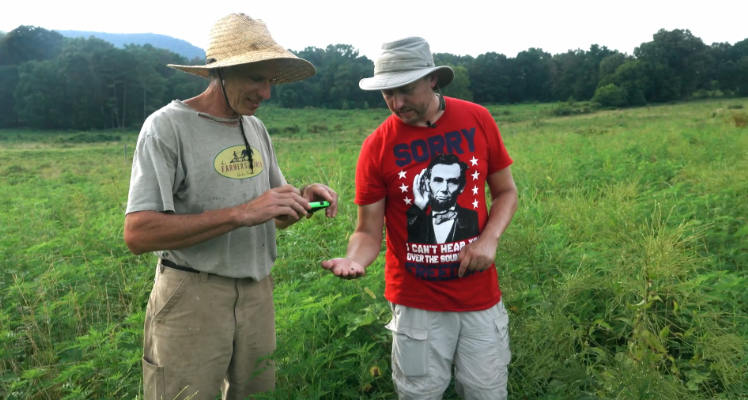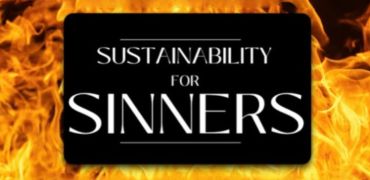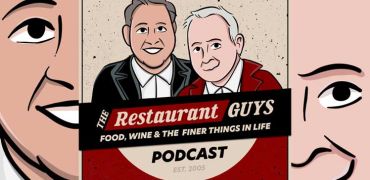Can livestock farmers be climate heroes?
PUBLISHED 17 August 2023
SOURCE: Erin Spillane Planet Contributor, Telluride Daily Planet
Find out Monday at the Sheridan Opera House
 AMP farmer Bill Keener (left) and agroecologist Jonathan Lundgren talk about bugs on Keener’s farm. A screening of the documentary “Roots So Deep” will take place Monday, Aug. 21, at the Sheridan Opera House. (Photo courtesy of Carbon Nation)
AMP farmer Bill Keener (left) and agroecologist Jonathan Lundgren talk about bugs on Keener’s farm. A screening of the documentary “Roots So Deep” will take place Monday, Aug. 21, at the Sheridan Opera House. (Photo courtesy of Carbon Nation)
Listen up, Telluride.
Mountainfilm, the Telluride Foundation and Telluride Science are screening a thought-provoking film Monday, Aug. 21, at the Sheridan Opera House that may provide an antidote to this summer’s barrage of devastating climate news.
The documentary, titled “Roots So Deep (You Can See the Devil Down There)”, asks whether a farming practice known as Adaptive Multi-Paddock grazing, often referred to as AMP grazing or AMP farming, can be a winner on multiple fronts, including climate.
The show starts at 6:30 p.m. with a pre-screening reception at 5:30.
The evening concludes with a discussion with Peter Byck, the film’s maker. Byck is a professor of practice in the School of Sustainability and the Walter Cronkite School of Journalism at Arizona State University.
Byck was also the writer, director and producer of the documentaries “Carbon Nation” and “Garbage.”
With “Roots So Deep”, Byck explores the potential of regenerative livestock farming through a study that directly compares methods by pairing five AMP farmers with five conventional farmers. Located around the southeastern United States, the pairs are neighbors whose farms border each other and whose lands are pretty much identical.
“What we did was we found the AMP farmer and the AMP farmer had a neighbor who was farming conventionally,” Byck said. “They were managing their land differently for at least a decade, usually much longer, and we found the same soil type on both farms, the same slope and aspect to the sun. We got as much apples-to-apples as we could get in a real-world setting.”
Byck explained that AMP farmers manage their livestock in a way that mimics the bison that once roamed the Great Plains.
“A herd of bison would eat about half the forage and then they’d move on,” he said. “They’d only eat half because that’s the part that tastes good and has the nutrients. What would happen next is they stomp the rest down, this covers the soil, which keeps it cool and keeps it from losing moisture.”
Byck continued, “Because they are in a tightly packed herd, the urine and manure is evenly spread and then when they move on, the plants really want to re-grow and they have all this manure and urine for fertilizer and so they regrow like crazy. The photosynthesis goes into hyperdrive and the plants are sucking in that CO2 from the atmosphere, bringing the carbon into the soil.”
Conventional farming, which rose to prominence after World War II, keeps cattle in one large pasture where they eat the grass down, requiring the farmer to use labor-intensive methods, like the spreading of store-bought fertilizer, to get the grass to re-grow.
For each pair of farmers, Byck and his team “measured a series of metrics that we, the science team, had developed — what’s happening with the soil, what’s happening in the water, what’s happening with the biodiversity, the microbes, bugs, birds, greenhouse gasses. Everyone knows that cows emit methane, right? So, is there enough carbon coming down into the soil to counterbalance that?”
In addition to those metrics, there was also the question of saving farmers money.
“Is this a cheaper way to operate?” Byck said of the AMP method. “Are there lower operating costs, less fuel needed, less fertilizer to be purchased (or none)? Are the animals healthy so the medical needs go down? Is the work more efficient so that farmers are working less?”
He added, “Really, our scientific question cooked down to this: Is AMP grazing better for the farmer?”
Byck noted that while the film “was borne out of a scientific research project” he was surprised to find that while the enthusiasm and knowledge of the scientists certainly contributes to the film’s appeal, it’s the farmers — articulate, hardworking, engaging — who steal the show.
“I realized early on that this is about the farmers, with the scientists as supporting characters,” he said.
Interestingly, some of those highly appealing farmers, including some of the AMP farmers, are climate skeptics, often stung by criticism that as livestock farmers they are climate villains.
As a result, Byck and his team tread lightly in “Roots So Deep.”
“We’re just here to measure,” he remarked. “We’re learning from them.”
Byck continued, “It’s an ethos that we developed when we made ‘Carbon Nation’ back in 2007. It’s a no-blame, no-shame position. It’s always important for me to remember that ... blaming won’t help. No one wants to be told they’re doing something wrong. And they aren’t doing something wrong. They’re doing it the way they were taught and who wouldn’t do that?”
Monday’s event at the opera house will see the first and last of the four one-hour episodes screened as the complete series awaits wider distribution.
Over those two hours, Byck noted, many of the study’s results are revealed, and as the revelations mount, the questions do too.
Which farm will have healthier livestock, soil and ecosystems? Which will be more beneficial for wildlife and water cycling? Whose bottom line will be more robust? Can livestock farmers be climate heroes? And, perhaps most compellingly, will any of this change the minds of the conventional farmers?
Said Byck, “All I can say is that our friends in Telluride will find out on Monday night.”
The special community screening of “Roots So Deep” takes place Monday at the Sheridan Opera House. Reception at 5:30 p.m. with a cash bar and complimentary appetizers, screening at 6:30 p.m. and discussion to follow. A $10 donation is suggested and the film is suitable for all ages.


